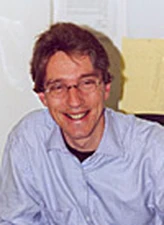Henk A. Dijkstra

The 2005 Lewis Fry Richardson Medal is awarded to Henk A. Dijkstra for his outstanding work in developing the nonlinear dynamical systems approach to oceanography and especially for his study of the role of ocean circulation in palaeoclimate.
Henk A. Dijkstra is Full Professor for Physical Oceanography at Colorado State University, Fort Collins. After graduating in applied mathematics at the university of Groningen in 1984, he worked on his Ph.D. in Groningen on a Spacelab experiment and on Marangoni convection under microgravity conditions. He continued this research in chemical engineering at Cornell University. In 1990 he started working on physical oceanography and became Assistant Professor at Utrecht University, in 1996 an Associate Professor and in 2001 a Full Professor there. Henk Dijkstra has developed consequently the nonlinear dynamical systems approach to oceanography. Mainly to emphasize that he first computed explicit bifurcation diagram for a global ocean circulation model and explained the structure of equilibria for a hierarchy of models going from a single-hemispheric to the global configuration. He discovered the multidecadal mode in single-hemispheric thermohaline flows and explained its relevance in the Atlantic Multidecadal Oscillation. He demonstrated the existence of steady separation patterns in northern hemispheric western boundary currents and explained the subannual variability through barotropic destabilization of these states. He first analysed the stability of the double-gyre wind driven flows in quasi-geostrophic one- and two-layer models and demonstrated its relevance with respect to low-frequency variability of the ocean gyres.
He became member of the Royal Dutch Academy of Sciences and Arts in 2002. He has published more than 100 papers and a book on Nonlinear Physical Oceanography in 2000. He has organized for several years a session at EGS/EGU meetings on this topic.
Publication resulting from the medal
Dijkstra, H. A.: Numerical bifurcation methods applied to climate models: analysis beyond simulation, Nonlin. Processes Geophys., 26, 359–369, https://doi.org/10.5194/npg-26-359-2019, 2019.
